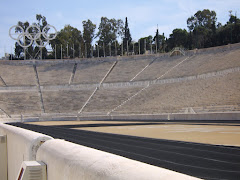For the Olympic or sports enthusiast, it's a fun read!
Though I was familiar with the back story for Michaels' famous 1980 Olympic ice hockey play-by-play and miraculous game-closing commentary that punctuated the event (I vaguely recall age six memories of the first time it aired on ABC in tape delay), when the review copy arrived from William Morrow, it was a no-brainer to skip to Chapter 9 and read the first-hand account of the author's experience during and since that fateful day for Team USA.
Even for those without a visit to Lake Placid, N.Y., under their belt, Michaels' descriptions of the Winter Olympic scene paint a vivid picture of how intimate the venue was when the pucks were in action (the rink is inside a small field house unlike any modern ice arena, much like a "Hoosiers" small town field of play).
In addition to his Miracle On Ice memories, Michaels shared many other five-ringed influences and experiences on the pages of "You Can't Make This Up," notably:
- As a youthful fan of most sports, Michaels recalls "immersing myself in the stories" in a 300-page 1950s era Olympic history book his grandparents gave him at age nine or 10.
- The same book came in handy when Michaels accepted his first Olympic broadcasting assignment for NBC's coverage of the 1972 Sapporo Winter Olympics in Japan, where he got his first hockey broadcast assignment for the gold medal U.S.S.R. vs. Czechoslovakia game.
- Michaels' first trip to Los Angeles Coliseum was in 1958 (for an L.A. Rams game) when his family relocated from Brooklyn. He later provided ABC's track and field commentary in this Olympic stadium in 1984.
- When asked to name the greatest athlete of all time, Michaels chooses Jim Thorpe. "Here was a man with so much talent and skill that he played professional football and baseball, and won Olympic medals. How differently would we think about Jim Thorpe today if his whole career had been played out on television?"
- Notes on work with dozens of professionals who also became Olympic or other sports broadcasting legends, including Roone Arledge, Howard Cosell, Jim McKay and Bob Costas.
- Cosell's disdain for ABC colleagues and decisions made during the 1972 Munich Olympic hostage crisis (after being passed over for the hard news assignment involving Israeli athletes). Michaels also tells is like is was when Cosell became "the world's biggest pain in the ass" just before the Los Angeles Olympics, where Cosell feigned reluctance to provide boxing commentary.
- Perspectives on Arledge, including a chapter on the evolution of storytelling as involved with Olympic coverage. This section also features some surprising details about behind-the-scenes snafus during live Olympic reports in Los Angeles, some with O.J. Simpson and Wilma Rudolph. Great POV related to Joan Benoit, Michael Gross, Maricica Puica, Carl Lewis and many other 1984 Olympic champions.
- Brief notes on covering other Winter Olympic victories including Scott Hamilton, Katarina Witt, Jane Torvill and Christopher Dean in Sarajevo. At a special event in Calgary, Michaels explained some tricks of the trade to Warren Buffett.
- Thoughts on appreciation juxtaposed with disappointment when he learned -- during a drive past Atlanta's under-construction Olympic stadium -- the 1996 Olympic and 1995 World Series broadcast assignments he would not experience.
- Great recent Games notes on Michaels' work in Vancouver, London and Sochi for NBC Olympics reporting, where a 30+ year question about Lake Placid finally got answered.
Lessons on the value of hard work and lasting professional relationships, instilled by his family and mentors, are another key takeaway from this quick read.
I recommend "You Can't Make This Up" and look forward to seeing more of Michaels on future Games broadcasts, now informed by more of his personal storytelling.
Images via William Morrow and Sports Illustrated/CNN
















No comments:
Post a Comment